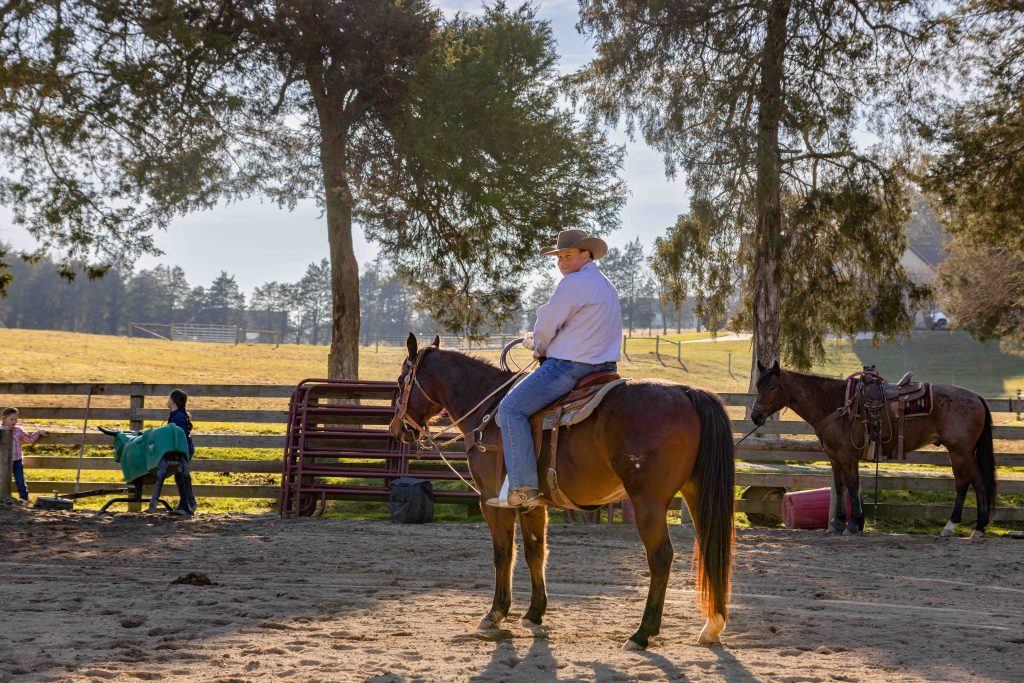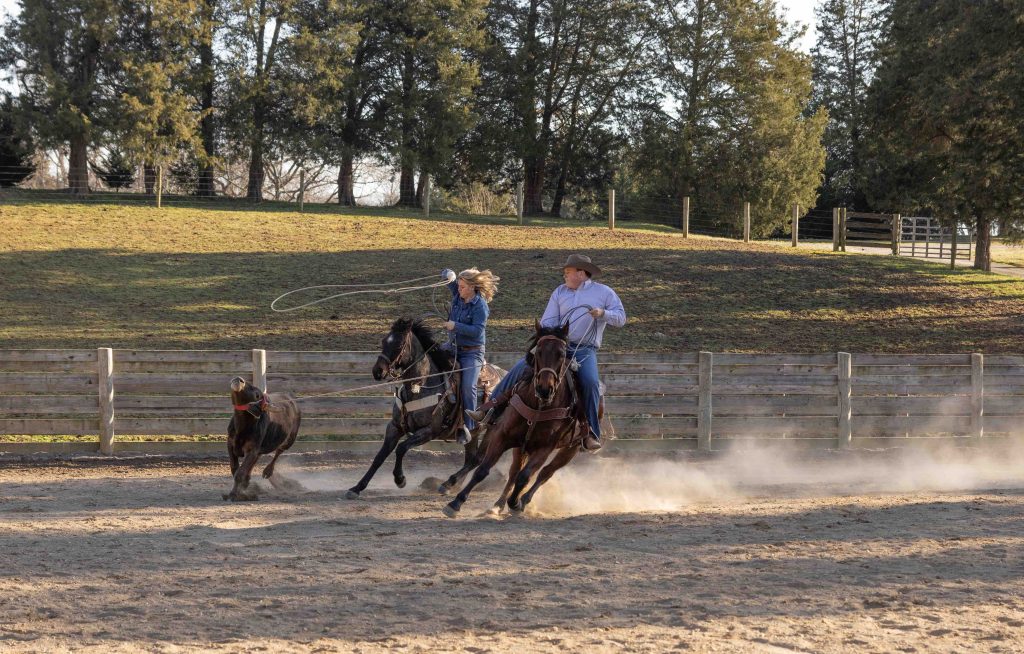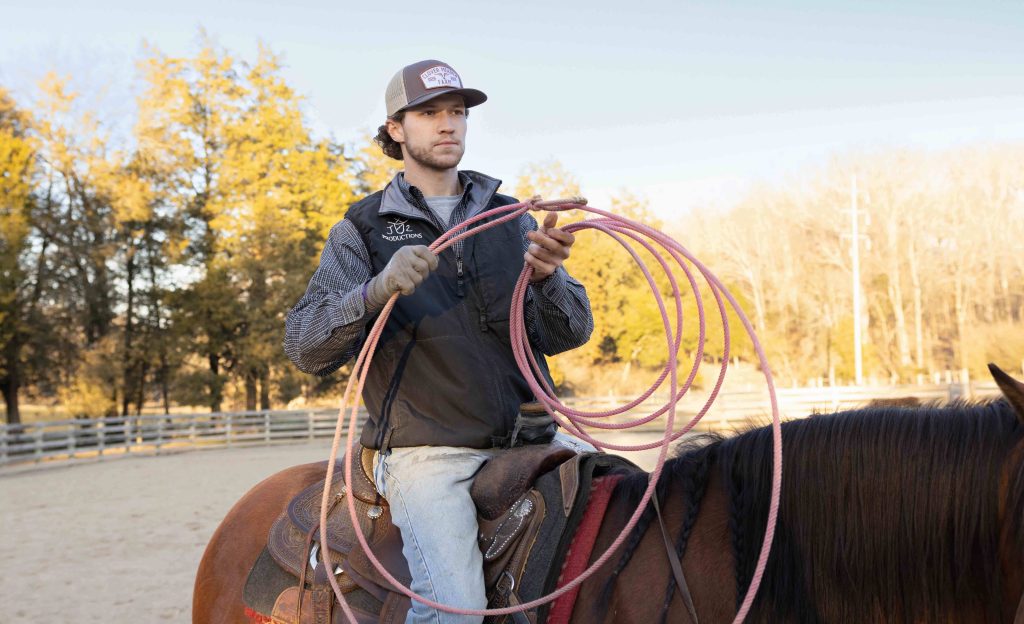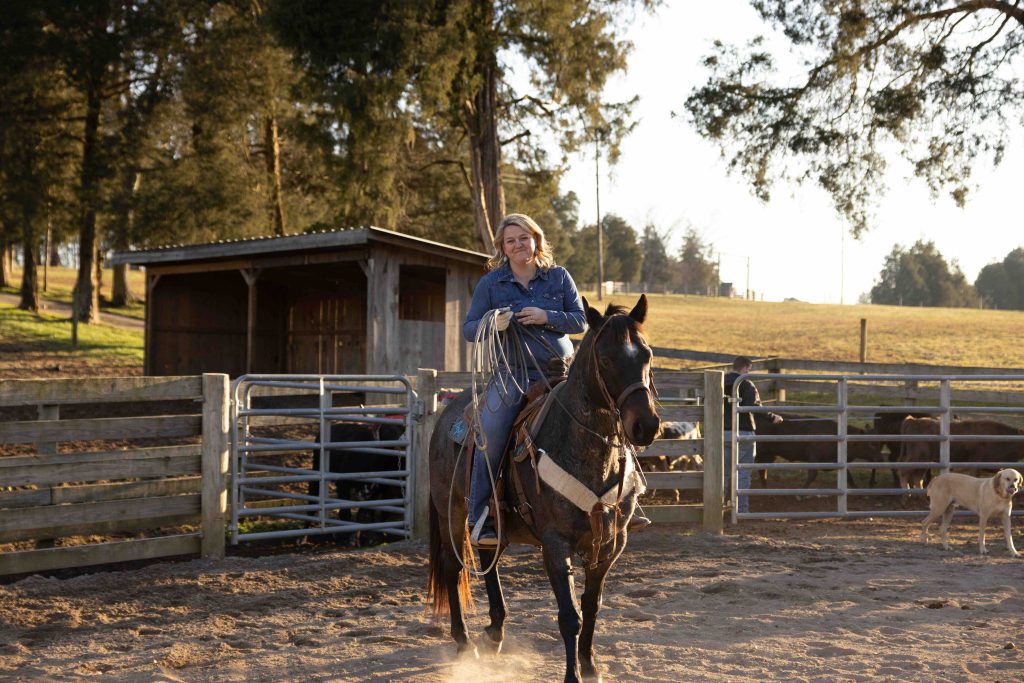Move over Yellowstone. The real cowboys are right here in East Tennessee.
Horses whinny and snort in the sunlit meadow of Clover Meadow Farm in Lenoir City on a late Winter afternoon. Carson Farmer, who calls the farm home, readies his horse inside the adjacent arena where they will practice. On this day, he’s invited a few other members of the roping community to join him at the farm to partake in the sport they’ve all spent their lives adoring.
A few yards away, Judd and Nikki Davis get their horses saddled up and ready for the afternoon of roping. Judd walks toward the arena leading two horses carrying the Davises’s young girls. Growing up on the family’s property, Smoky Vue Farm, in the Thorn Grove Community in east Knox County they seem to have a natural affinity for all things equine. This is a multi-generational farm first established in 1911 as a dairy farm by Judd’s great grandfather.
Nikki smiles and her eyes brighten. “The thing we love most about it is that it’s a sport you can do with your family,” she says. “Roping started out with my dad and my brother, doing it together, and now my children are showing some interest in it. It’s not like most sports, where you grew up playing and then kind of quit. This is a sport you can continue on with your children and their children.”
There is a little more to roping’s allure that draws men and women, collegians, teens and youth to compete in high-stakes rodeo events not only in and around Knoxville but throughout the Southeast and the nation. “Well, the most exciting thing is to win, as it is with any competition,” Nikki says with a laugh.
This braiding of several strands—family bonding, camaraderie, generational ties, and high-intensity competition—links Knoxville’s roping standouts. They take to rodeo arenas regularly with friends, family, fellow cowboys and cowgirls to compete for hardware and prize money on the amateur, semi-pro and professional levels. Cityview visited with several top local ropers and emerged with a deep appreciation for all that they bring to our community and culture.

Sisters in the Saddle
Take Lucinda Fletcher and her little sister, Natalie. The duo grew up on a family farm dating back two centuries near The Cove at Concord Park off of Northshore Drive. As they talk about what roping means to each of them—and especially their passion to pass on that love to the next generation—they exude a contagious joy and exuberance.
“We always had horses on the farm, and our great-grandfather got into and loved rodeo,” says Lucinda, who continues to travel to weekend rodeo events far and wide, working around her career as a psychiatric nurse practitioner. Her husband, Joel, grew up in a rodeo family and competes in team-roping and steer-wrestling.
“The rule in our house growing up was that you can’t practice roping unless your homework is done,” says Natalie with a smile, adding that the sisters roped before and after school just about every day and all summer long. Natalie also competes around her work as an equine veterinarian.
Both Fletchers compete in the discipline of calf-roping known as breakaway roping, standard fare for women’s collegiate, semi-pro and pro rodeo. In breakaway, one mounted rider and a calf leave their respective chutes. The rider lassos the neck of the calf as quickly as possible. Natalie explains, “We rope the calf, and at that point our rope breaks away from our saddle horn. When the end of the rope [marked by a bandana] flies off, that’s when our time stops.”

Breakaway roping is exciting and fast-paced—a good time can be just a few seconds—not unlike the sisters’ own rapid rise on the roping scene. Beginning when they were 6 and 8, Natalie and then Lucinda steadily advanced through the junior-rodeo ranks to become nationally known, decorated ropers by their teen years.
As students at Farragut High, they advanced to the national finals each year. They both attended the University of Tennessee-Martin and competed on the Skyhawks’ rodeo team, racking up honors and accolades while pursuing their respective degrees.
Today, while they continue to compete, their focus has shifted toward helping emerging ropers learn the craft through lessons and rides hosted at the family farm.
“Not everyone gets to be around horses like we have,” Natalie says. “My heart is for those kids in a neighborhood who think they could never ride or rope. They come here, learn it, and get the bug. I love to invest in that younger generation to help them experience roping and to keep growing the sport.”
“We also spend time taking our kids we are training to their rodeos,” Lucinda says, “and that’s a really fun part of it for me—to see them learn and compete.”
It Gets in The Blood
Not far away in Loudon County, Carson trod a different trail into rodeo. It all started when he turned 16 and his dad told him to “go find a job or something to do.”
The reason for that spur toward action? Carson had excelled at football as a youth like his father Joel Farmer, a University of Tennessee-Knoxville alumnus who played long snapper on the Volunteers’ Sugar Bowl championship team in 1985. But Carson “just lost the passion for football” as a sophomore in high school and began “looking for something that could last a lifetime.”
As fortune would have it, the Farmers lived across Union Road from a neighbor who boarded horses. “I would go over and help this lady with the horses, and that got me into it; I learned to do it the right way. I fell in love with horses before I fell in love with the sport of roping,” Carson says.

It didn’t hurt that a great uncle was a horseman and roper. “Once I heard that you can compete with horses in rodeo, I was like, ‘Here we go!’ I started high school rodeo at the end of my sophomore year. I found out you could get out of class early on a Friday afternoon [to travel to weekend rodeo events], so that worked out great,” he says with a laugh.
Like many other male ropers, Carson focuses primarily on team roping and in individual tie-down roping. In team roping, two riders working together, each with a rope, attempt to lasso a calf on the run; the “header” rider lassos the horns, and then the “heeler” lassos the back legs. In tie-down roping, a lone rider attempts to lasso a calf, dismount the horse, and tie the calf’s front and rear legs. (The world record in that discipline is just over six seconds.)
Carson worked his way up from amateur regional events in high school to the professional ranks, focusing mostly on team roping. He typically ropes the horns as header, “but I also enjoy heeling. I try to stay sharp on both.”
“It gets in your blood,” he says of horses, rodeo and roping. He continues to compete while operating a beef processing plant in Oak Ridge and living on the “back 40” of the family’s farm in Loudon County. His dad Joel, while also busy with business endeavors, likes to rope alongside him.
For anyone thinking of joining the fray for themselves or for their children, Carson and our other local roping experts say that the most important factor is horsemanship and riding a quality horse.
“Horses are a big responsibility,” he says. “You want to have good stock.”
Rodeo on the Rise
On another afternoon back at the Davis farm, Judd is out of breath just working on “learning to pin calves, my daughters and me.” He and Nikki embody a lengthy legacy of ranching, farming, horses and livestock in and around East Tennessee.
“Our kids are sixth-generation on the farm. It’s something we can do as a family, so we know it will continue,” says Judd, who enjoys competing in team-roping events.
“I’ve always ridden, since I was a baby,” he says. “I didn’t’ start roping until I was out of high school. I played three sports [at Webb] all the way through. Nikki started when she was 10, so it goes way back with us.”

It also appears to be going way forward. The Davises have seen a recent rise in interest in rodeo among Knoxville families. “Nikki teaches lessons, and just over the last two years, we’ve noticed a big pick-up in people wanting their kids to get outside and ride horses,” Judd says.
Especially for children but also for adults who want to learn horses and roping, expert guidance and supervision are paramount. “When you’re sitting on a 1,200-pound animal and you’re gonna put a rope around the horns of a 600-pound animal, there’s a lot that can go wrong,” he says. “You’ve got to be careful.”
One alluring aspect of the sport that ropers share is the rich heritage of rodeo in America. Having developed mostly in the western U.S. and worked its way back east, riding horses and competing in rodeo events evokes a roughhewn and rugged pioneer spirit and a toughness that characterizes those who have lived the ranch or farm life over the centuries.
“There’s such a rich history with it,” says Lucinda, “but not everyone understands all that goes along with it.” For example, because of modern-day portrayals in movies and on TV, when some folks hear that she and Natalie are rodeo pros, they assume, “Oh, so you ride bulls?”
Interest and awareness of the sport are “definitely growing,” Natalie says. “When we were in high school and we told someone we rodeo, they would go, ‘What is that?’ Now there are a lot more kids getting into it. It’s not feasible for everyone. It involves buying horses and trucks and traveling the world. But it’s so rewarding.”
A Tight Knit Community
Back in Lenoir City, as Carson and the Davises finish their afternoon of roping, there’s a deep sense of appreciation for this sport they’ve all grown to love. Knoxville’s rodeo community is “so tight” and friendly, Nikki says. “Everybody knows everybody. If someone has a hurt horse or needs a trailer or anything else, everybody jumps in to help.”
And as they unsaddle their horses and close up the arena for the night, that pride, excitement, and camaraderie in the sport is felt by all. “If me and Carson go out there and we’re roping against each other, we’re in it to win, but we’ll be the first one to pat each other on the back and say, ‘Man, you did great.’ Most all of us are that way with each other,” Nikki says, Carson nodding along. “I mean yeah, we want to win, sure, because it’s a competitive sport. But we also want to see our buddies do well, too.”

Comments are closed.